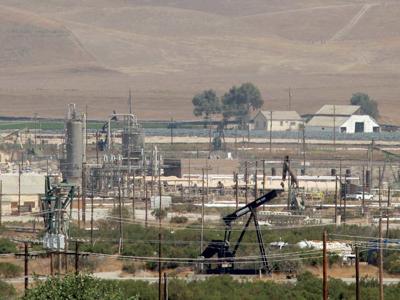California Supreme Court Rules County Ordinance Limiting Oil & Gas Development Preempted by State Law
Court Decision May Well Be Correct as a Matter of Law, But Represents Outdated & Unsound Public Policy
 Last week, the California Supreme Court unanimously ruled that a local initiative measure that would have imposed severe restrictions on oil and gas development in Monterey County is preempted by state law and therefore invalid. The decision came in the case of Chevron U.S.A., Inc. v. County of Monterey.
Last week, the California Supreme Court unanimously ruled that a local initiative measure that would have imposed severe restrictions on oil and gas development in Monterey County is preempted by state law and therefore invalid. The decision came in the case of Chevron U.S.A., Inc. v. County of Monterey.
The Supreme Court’s ruling was predictable, given the Court’s previous preemption decisions. However, it’s a disappointment to the initiative’s proponents and to a larger group of environmental advocates who seek to promote California’s rapid transition from reliance on heavily-polluting and climate-damaging fossil fuels to renewable energy resources. But the good news is that this goal can still be achieved through other legal and political strategies.
I wrote an earlier Legal Planet post previewing the County of Monterey case describing the relevant facts and issues before the case was argued before the Supreme Court last May. Briefly, in 2016 a local environmental group, Project Monterey County, sponsored a voter initiative–titled “Measure Z”–that qualified for the local ballot and was enacted by Monterey County voters by a 56% margin. Measure Z by its terms would have barred the drilling of new oil and gas wells in Monterey County and prohibited the use of fracking technology for both new and existing county wells.
Measure Z never took effect. It was promptly challenged on constitutional grounds by a coalition of oil and gas companies led by Chevron U.S.A. The Monterey County Superior Court invalidated the measure, concluding that it was preempted by contrary, longstanding state law. The California Court of Appeal agreed in a 2021 decision.
After the County abandoned its defense of Measure Z on appeal, Project Monterey County stepped in and successfully sought review by the California Supreme Court. But in its August 3rd decision, the Supreme Court justices found Measure Z just as constitutionally deficient as had both lower courts.
Specifically, the justices concluded that Measure Z “contradicts–and thus is preempted by” a nearly century-old system of oil and gas regulation of California’s oil and gas industry administered by state officials. Their decision focused in particular on California Public Resources Code section 3106, which grants the California Geologic Energy Management Division (“CalGEM”) broad authority to permit, regulate and condition oil and gas development in the state. Measure Z, concluded the Supreme Court, is far more restrictive of oil and gas development in Monterey County and thus conflicts with the state statute.
The justices similarly determined that the state-administered regulatory system “occupies the field” of oil and gas development in California, leaving no room for duplicative or inconsistent local regulation:
[H]ere, both section 3106 and Measure Z address the same topic of how oil producers and well operators should be permitted to extract oil.
The Supreme Court’s decision in County of Monterey is a perfectly reasonable application of longstanding state preemption principles regarding local regulations that conflict with or are redundant when compared to established state law.
But this view ignores the fact that state laws with respect to oil and gas development in California are fundamentally inconsistent with one another. On the one hand, the basic system of oil and gas regulation in the Golden State remains largely unchanged since the Legislature first enacted that system in the 1930’s–an era when fossil fuel development was seen as essential to California’s economic and social well-being.
However, by the start of the 21st century the pernicious effects of fossil fuel emissions–in terms of both conventional air, water and ground pollution and the discharge of greenhouse gas emissions that profoundly disrupt our climate–were well-established and widely acknowledged. Beginning in 2002, the California Legislature and state regulators have enacted countless laws to abate those destructive emissions in favor of pivoting to reliance on renewable energy sources. Moreover, a broad political consensus has emerged among Californians that we must abandon our historic dependence upon polluting fossil fuels–the sooner, the better.
In short, California’s state laws concerning fossil fuel development are themselves conflicting to the point of being downright schizophrenic. The state’s longstanding, languid system of traditional oil and gas regulation should be quickly replaced, if not abandoned altogether.
Reports are that a statewide initiative is being drafted by environmental groups and climate activists that would adopt–on a statewide basis–many restrictions on current and future oil and gas development similar to those found in Monterey County’s Measure Z. Such a measure, if it qualifies for the state ballot and is enacted by state voters, would not be subject to preemption challenges like those that wound up nullifying Measure Z. Indeed, the California Legislature could itself adopt such a statewide law to rapidly phase out traditional oil and gas development in favor of reliance on renewable energy sources–thus making an expensive statewide initiative campaign unnecessary.
The California Supreme Court’s decision in County of Monterey is a plausible and understandable one, given legal precedents. But that decision fosters and perpetuates a fossil fuel industry in a manner that represents fundamentally unsound public policy. The Legislature, state regulators and–if necessary–California voters–should change state law to prohibit new and disincentivize continued oil and gas development in California–and do so as soon as possible.







Reader Comments